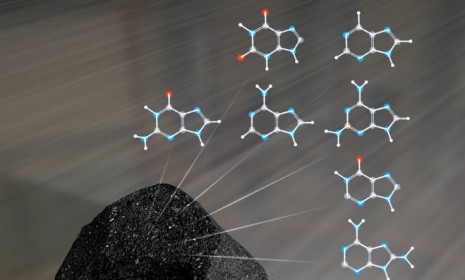The DNA from outer space
Did life on Earth begin with a meteorite carrying the building blocks of DNA? NASA scientists think it's possible

A free daily email with the biggest news stories of the day – and the best features from TheWeek.com
You are now subscribed
Your newsletter sign-up was successful
While we haven't quite discovered extra-terrestrial life yet, we may be inching closer. Scientists worldwide are excited about NASA's recent announcement that the building blocks of DNA have been discovered on several meteorites — and that these meteorites' DNA components are not the result of any contamination from here on Earth. The discovery adds weight to the theory that life on our planet may have been started by meteorites, comets, or other objects that fell to Earth. Here, four key questions:
What did the NASA team find?
Scientists analyzed 12 meteorites — nine of which were found in Antarctica — and discovered that 11 of the 12 meteorites contained traces of adenine and guanine. These are two of the four compounds — called nucleobases — that are needed to form the structure of DNA. The scientists also found three other exotic compounds that are similar to nucleobases, called nucleobase analogs.
The Week
Escape your echo chamber. Get the facts behind the news, plus analysis from multiple perspectives.

Sign up for The Week's Free Newsletters
From our morning news briefing to a weekly Good News Newsletter, get the best of The Week delivered directly to your inbox.
From our morning news briefing to a weekly Good News Newsletter, get the best of The Week delivered directly to your inbox.
How do scientists know these compounds aren't from Earth?
Because the three exotic nucleobase analogs aren't found in life forms on Earth, scientists are confident that all the DNA building blocks found on the meteorites came from outer space or were formed in the meteorites themselves. The researchers also analyzed the ice and dirt in the areas where the meteorites fell, and found no trace of the three strange nucleobase analogs (and very little of the two DNA building blocks).
Does this mean that life on Earth may have started with a meteorite?
Possibly. While scientists have detected DNA building blocks on meteorites in the past, they assumed that the material was the result of contamination after the celestial objects fell. NASA's new research builds a stronger case that meteorites can support biological life.
A free daily email with the biggest news stories of the day – and the best features from TheWeek.com
What about life on other planets?
If NASA's findings hold up under scrutiny, it opens up the intriguing possibility that meteorites could have "seeded" other planets, and that these worlds may contain some kind of life form. "It certainly changes our picture of life in the universe," says Clay Dillow at Popsci.
Sources: NASA, Popsci, Washington Post
-
 The environmental cost of GLP-1s
The environmental cost of GLP-1sThe explainer Producing the drugs is a dirty process
-
 Greenland’s capital becomes ground zero for the country’s diplomatic straits
Greenland’s capital becomes ground zero for the country’s diplomatic straitsIN THE SPOTLIGHT A flurry of new consular activity in Nuuk shows how important Greenland has become to Europeans’ anxiety about American imperialism
-
 ‘This is something that happens all too often’
‘This is something that happens all too often’Instant Opinion Opinion, comment and editorials of the day